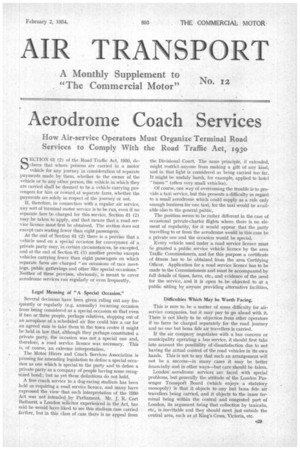Aerodrome Coach Services
Page 43

If you've noticed an error in this article please click here to report it so we can fix it.
How Air-service Operators Must Organize Terminal Road Services to Comply With the Road Traffic Act, 1930
SECTION 61 (2) of the Road Traffic Act, 1930, declares that where persons are carried in a motor vehicle for any journey in consideration of separate payments made by them, whether to the owner of the vehicle or to any other person, the vehicle in which they are carried shall be deemed to be a vehicle carrying passengers for hire or reward, at separate fares, whether the payments are solely in respect of the journey or not.
If, therefore, in connection with a regular air service, any sort of terminal motor service is to be run, even if no separate fare be charged for this service, Section 61 (2) may be taken to apply, and that means that a road service licence must first be obtained. The section does not except cars seating fewer than eight passengers.
At the end of Section 61 (2) there is a proviso that a vehicle used on a special occasion for conveyance of a private party may, in certain circumstances; be excepted, and at the end of Section 61 (1) another proviso excepts vehicles carrying fewer than .eight passengers on which separate fares are charged "on occasions of race meetings, public gatherings and other like special occasions." Neither of these provisos, 'obviously,. is meant to cover aerodrome services run regularly or even frequently.
Legal Meaning of "A Special Occasion."
Several decisions have been given ruling out any frequently or regularly (e.g. annually) recurring occasion from being considered as a special occasion so that even if two or three people, perhaps relatives, stepping out of an aeroplane of a scheduled air line could hire a car for an agreed sum to take them to ,the town centre it might be held in law that, although they perhaps constituted a private party, the occasion was not a special one and, therefore, a road service licence was necessary. This is. of course, an extreme interpretation.
The Motor Hirers and Coach Services Association is pressing for amending legislation to define a special oecasion as one which is special to the party and to define a private party as a company of people having some recognized bond; but as yet these definitions do not hold.
A free coach service to a dog-racing stadium has been held as requiring a road service licence, and many have expressed the view that such interpretation of the 1930 Act was not intended by Parliament.. Mr. • J. R. Cort Bathurst, a London solicitor experienced in the Act, has said he would have liked to see this stadium case carried farther, but in this class of case there is no appeal from the Divisional Court. The same principle; if extended, might restrict anyone from making a gift of any kind, and in that light is considered as being carried too far. It might be unduly harsh, for example, applied to hotel " buses " (often very small vehicles).
Of course, one way of overcoming the trouble is to provide a taxi service, but this presents a difficulty in regard to a small aerodrome which could supply as a rule only onough business for one taxi, for the taxi would be available also to the general public.
The position seems to be rather different in the case of occasional private-charter flights where there is no element of regularity, for it would appear that the party travelling to or from the aerodrome would in this case be a private one and the occasion would be special.
Every vehicle used under a road service licence must be granted a public service vehicle licence by the area Traffic Commissioners, and for this purpose a certificate of fitness has to be obtained from the area Certifying Officer. Application for a road service licence has to be made to the Commissioners and must be accompanied by full details of times, fares, etc., and evidence of the need for the service, and it is open to be objected to at a public sitting by anyone providing alternative facilities.
Difficulties Which May be Worth Facing.
This is sure to be a matter of some difficulty for airservice companies, but it may pay to go ahead with it. There is not likely to be objection from other operators if no fares be charged separately for the road journey and no one but bona fide air travellers is carried.
If the air company negotiates with a bus concern or municipality operating a bus service, it should first take into account the possibility of .dissatisfaction due to not having the actual control of the road vehicles in its own hands. This is not to say that such an arrangement will not be a success—in many cases it may be better financially and in other ways—but care should be taken.
London aerodrome services are faced with special problems, but generally the attitude of the London Passenger Transpoit I3oard (which enjoys a statutory monopoly) is that it objects to any but bona fide air travellers being carried, and it objects to the inner terminal being within the central and congested part of London, its argument being that collection by taxicabs, etc., is inevitable and they should meet just outside the central area, such as at King's Cross, Victoria, etc.




























































































